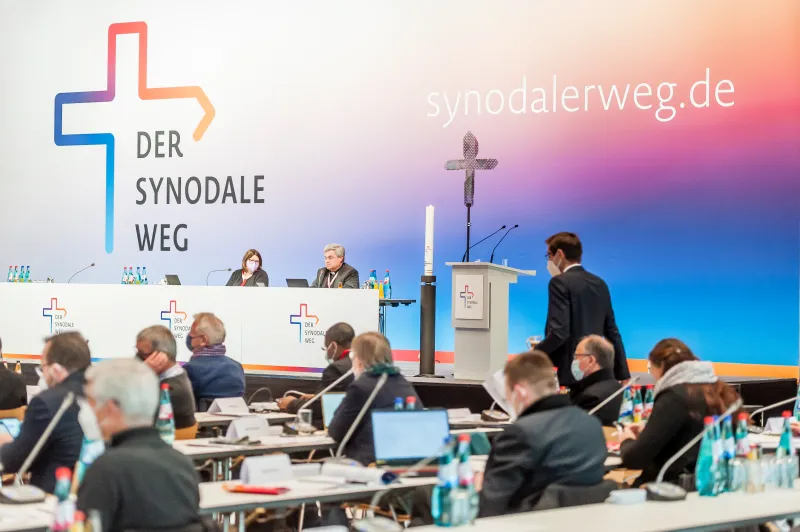
CNA Newsroom, Sep 7, 2022 / 06:31 am (CNA).
Shortly before the next assembly of the German “Synodal Way,” one of the founders confirmed the goal of establishing a permanent “Synodal Council.”
The move would create a permanent body to oversee the Church in Germany, according to the assembly’s schedule for Friday, Sept. 9.
Critics have drawn comparisons to communist Soviets and accused the process of reinventing existing Protestant structures.
The “Synodal Way” members will meet Sept. 8–10 for the fourth synodal assembly in Frankfurt.
CNA Deutsch, CNA’s German-language news partner, reported that several texts are scheduled for a second reading and could therefore be officially adopted.
The texts include calls to change the teachings of the Church on ordaining women to the priesthood and on sexual morality, especially in the matter of homosexuality.
From the outset, the process, which is not a synod, has courted controversy.

Speaking to a German online portal on Monday, Sternberg said a “Synodal Council” would be “a decisive, important continuation of the introduction of participatory structures, as it already began with the parish councils at the Würzburg Synod (1971–1975) and which is now proving increasingly urgent at the level of the bishops’ conference.”
Like others arising from the controversial German event, also known as the “Synodal Path,” the proposal has come under intense criticism.
In June, Cardinal Walter Kasper, a theologian considered close to Pope Francis, said there could be no “Synodal Council,” given Church history and theology: “Synods cannot be institutionally made permanent. The tradition of the Church does not know a synodal church government. A synodal supreme council, as is now envisaged, has no basis in the entire history of the constitution. It would not be a renewal, but an unheard-of innovation.”
Kasper has previously accused the organizers of the German “Synodal Way” of using a lazy trick that constituted a coup d’etat.
The president emeritus of the Pontifical Council for Promoting Christian Unity, who was bishop of the Diocese of Rottenburg-Stuttgart from 1989 to 1999, said the German process had invited comparisons to communist structures in the Soviet Union: “It was a political scientist, not a theologian, who recently expressed this notion somewhat strongly, referring to such a Synodal Council as a Supreme Soviet.”
The cardinal continued: “Soviet is an old Russian word that means exactly what we call a Rat, a council in German. Such a Supreme Soviet in the Church would obviously not be a good idea. Such a council system is not a Christian idea, but an idea coming from quite a different spirit or un-spirit. It would choke off the freedom of the Spirit, which blows where and when it wants, and destroy the structure that Christ wanted for his Church.”
Further concerns were raised by a professor of theology from the University of Vienna in June.
The dogmatist Jan-Heiner Tück warned that a German “Synodal Council” would transfer leadership authority “from sacramentally ordained persons to bodies, a conversion of power that shows a clear closeness to synodal practices in the Protestant Church in Germany.”
In June 2019, Pope Francis sent a 19-page letter to Catholics in Germany urging them to focus on evangelization in the face of a “growing erosion and deterioration of faith.”

The president of the German bishops’ conference, Bishop Georg Bätzing of Limburg, has repeatedly rejected concerns, instead expressing disappointment in Pope Francis in May.
In an interview published one month later, in June, Pope Francis reiterated that he told Bätzing that the country already had “a very good Evangelical [Lutheran] Church” and “we don’t need two.”
If you value the news and views Catholic World Report provides, please consider donating to support our efforts. Your contribution will help us continue to make CWR available to all readers worldwide for free, without a subscription. Thank you for your generosity!
Click here for more information on donating to CWR. Click here to sign up for our newsletter.





We read: “In June, Cardinal Walter Kasper, a theologian considered close to Pope Francis, said there could be no ‘Synodal Council,’ given Church history and theology: ‘Synods cannot be institutionally made permanent. The tradition of the Church does not know a synodal church government. A synodal supreme council, as is now envisaged, has no basis in the entire history of the constitution. It would not be a renewal, but an unheard-of innovation.’”
Is Kasper actually opposed to a permanent and rolling synod or, by offering this wording, is he deliberately rendering such a thing thinkable?
As with Councils, synods are what the Church DOES, synods are not what the Church IS. Unless, of course, nominalism and historicism are the new doctrine:
As in the okay exploitable Envanglii Gaudium: “realities are more important than ideas; time is greater than space; [and] unity prevails over conflict; and the whole is greater than the part.”
Cardinal Kasper is correct, the German Church cannot assume its own authoritative structure in a schismatic relation to the Magisterium.
This issue raises questions simply by comparative analysis to an unending Synod on Synodality, and its authoritative potency, if only by possible contradictory influence to the Magisterium regarding settled doctrine. Again, repeating what’s previously indicated, is the German Synodal Way simply a convenient canard to proclaim orthodoxy while undermining that orthodoxy?
There are two ways for a Pope to lead the Body 0f Christ’s Church into hell. One way is for a Pope to directly lead the Body of the Church into hell. The other way is for a Pope to fail to anathematize evildoers who do lead the Body of the Church into hell.
Jesus Commands His Church, that, if Her hand, foot or eye, of the Body of His Church is its downfall, Apostolic Successors are Commanded to ‘cut them off’ from the life of the Body of the Church and cast them into hell. Jesus teaches that it is better to throw a member of the Body of His Catholic Church into hell than to have evildoers lead the whole Body of the Church into hell by their sinfulness.
Matthew 18:5
“Whoever welcomes one such child for my sake welcomes me. On the other hand, it would be better for anyone who leads astray one of these little ones who believes in me, to be drown by a millstone around his neck, in the depths of the sea. What terrible things will come on the world through scandal! It is inevitable that scandal should occur. Nonetheless, woe to that man through whom scandal comes! If your hand or foot is your undoing, cut it off and throw it from you! Better to enter life maimed or crippled than be thrown with two hands or feet into endless fire. If your eye is your downfall, gouge it out and cast it from you! Better to enter life with one eye than be thrown with both into fiery Gehenna.
ANATHEMA
the formula of anathema which ends with these words: Wherefore in the name of God the All-powerful, Father, Son, and Holy Ghost, of the Blessed Peter, Prince of the Apostles, and of all the saints, in virtue of the power which has been given us of binding and loosing in Heaven and on earth, we deprive N– himself and all his accomplices and all his abettors of the Communion of the Body and Blood of our Lord, we separate him from the society of all Christians, we exclude him from the bosom of our Holy Mother the Church in Heaven and on earth, we declare him excommunicated and anathematized and we judge him condemned to eternal fire with Satan and his angels and all the reprobate, so long as he will not burst the fetters of the demon, do penance and satisfy the Church; we deliver him to Satan to mortify his body, that his soul may be saved on the day of judgment.” Whereupon all the assistants respond: “Fiat, fiat, fiat.” The pontiff and the twelve priests then cast to the ground the lighted candles they have been carrying, and notice is sent in writing to the priests and neighboring bishops of the name of the one who has been excommunicated and the cause of his excommunication, in order that they may have no communication with him. Although he is delivered to Satan and his angels, he can still, and is even bound to repent. The Pontifical gives the form for absolving him and reconciling him with the Church. The promulgation of the anathema with such solemnity is well calculated to strike terror to the criminal and bring him to a state of repentance, especially if the Church adds to it the ceremony of the Maranatha…
…He who dares to despise our decision, let him be stricken with anathema maranatha, i.e. may he be damned at the coming of the Lord, may he have his place with Judas Iscariot, he and his companions.
Quoted from: https://www.newadvent.org/cathen/01455e.htm
Luke 11:34
The lamp of the body is your eye. When your eye is sound, then your whole body is filled with light, but when it is bad, then your body is in darkness.
Matthew 11:20 Reproaches to Unrepentant Towns.
Then he began to reproach the towns where most of his mighty deeds had been done, since they had not repented. “Woe to you, Chorazin! Woe to you, Bethsaida! For if the mighty deeds done in your midst had been done in Tyre and Sidon, they would long ago have repented in sackcloth and ashes. But I tell you, it will be more tolerable for Tyre and Sidon on the day of judgment than for you. And as for you, Capernaum: ‘Will you be exalted to heaven? You will go down to the netherworld.’ For if the mighty deeds done in your midst had been done in Sodom, it would have remained until this day. But I tell you, it will be more tolerable for the land of Sodom on the day of judgment than for you.”